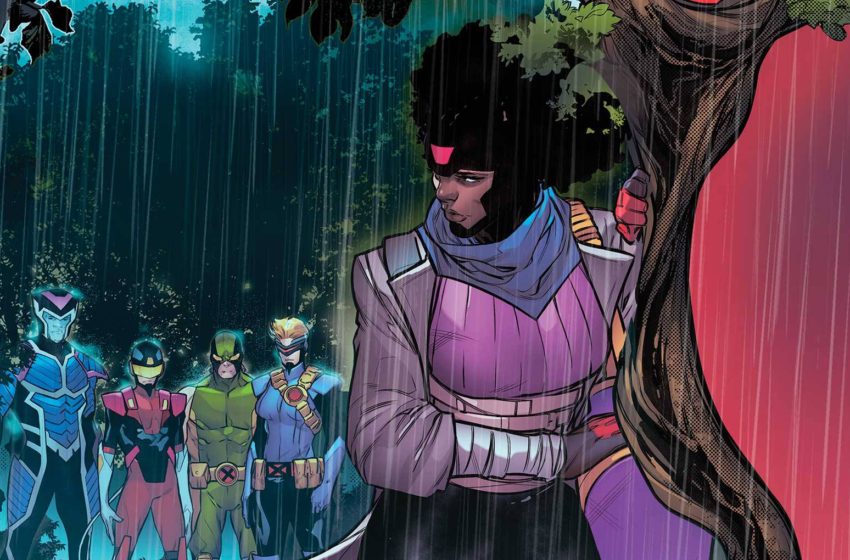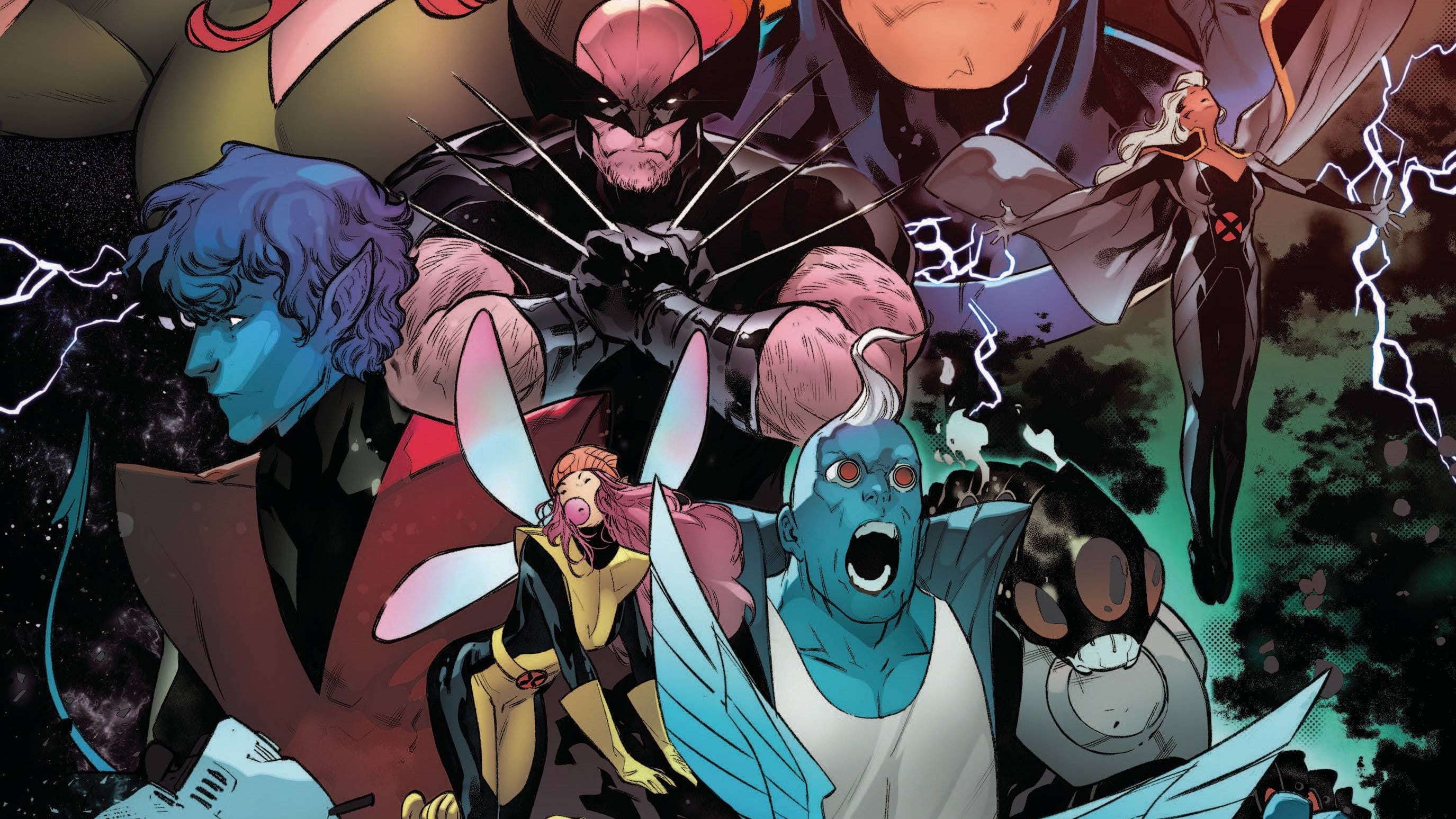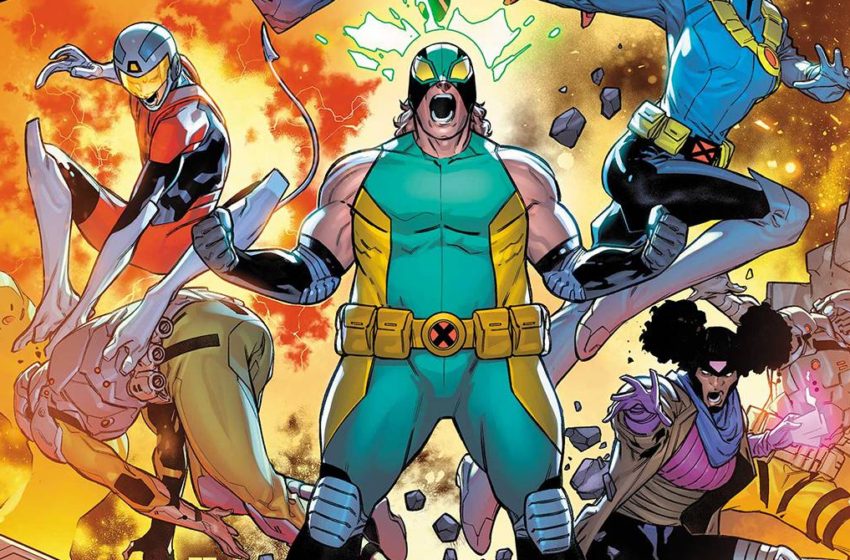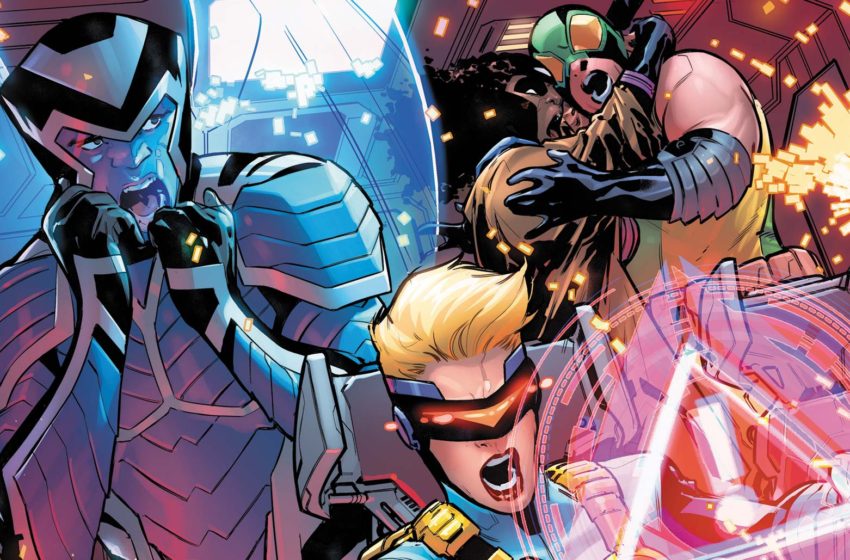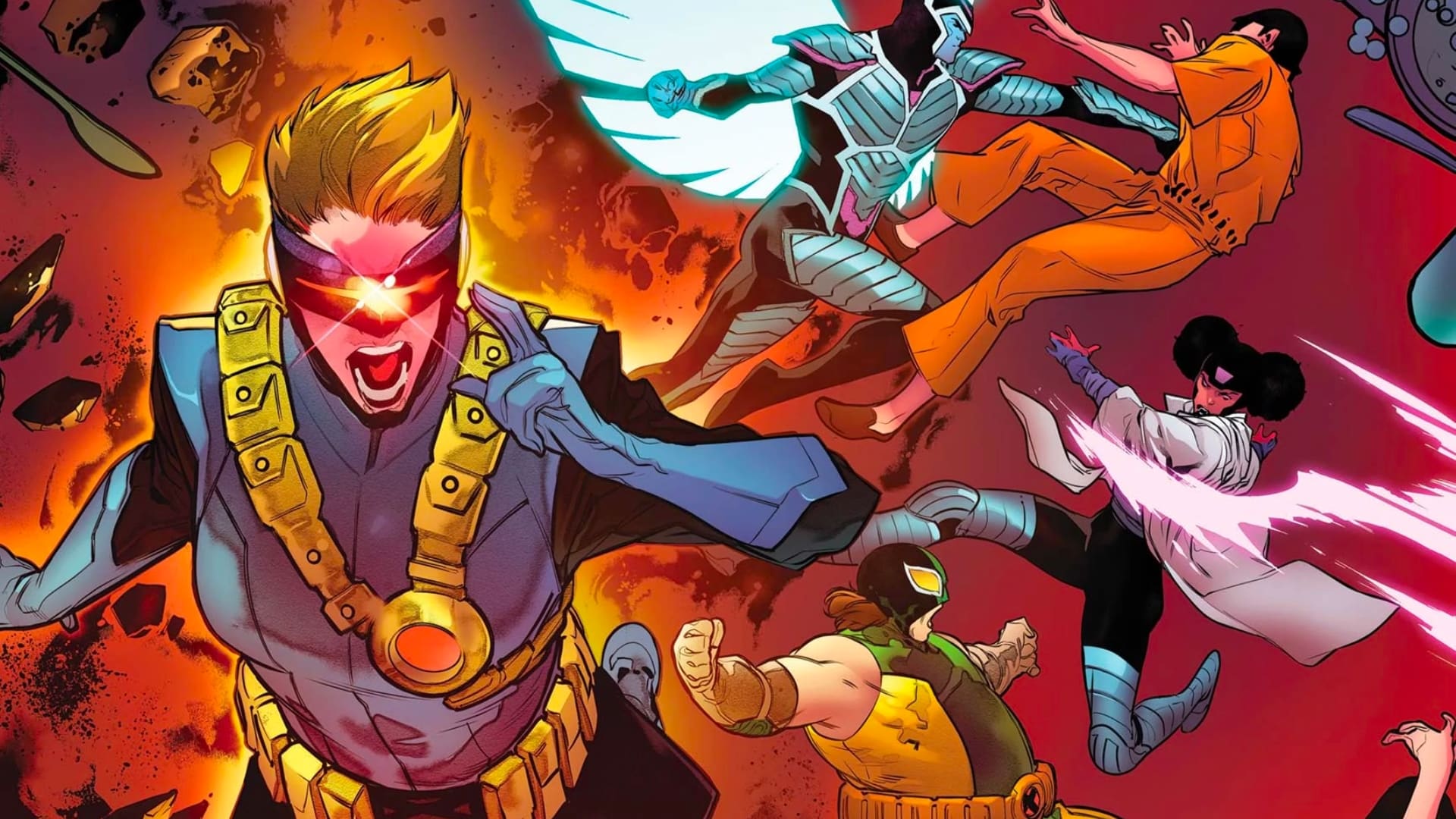Back to Gala! Carmen’s truth is out. She’s now forced to find a place between her friends and new family in Children of the Atom #6 by Vita Ayala, Paco Medina, David Curiel, and Travis Lanham.
Kenneth Laster: Here we are! At the end of the road! They grow up so fast!
Cassie Tongue: We just met these kids, and it’s already time to say goodbye. I’m not ready – but I’m not sure the series was either. There’s a lot to try to wrap up and we need a place to land. Where do we go from here? Let’s dive in to find out.

Return to the Hellfire Gala
Kenneth: Just when we think we’re out of the Gala they pull us back in! It was strange to see everyone back in their snazzy clothes since the books are solidly in the aftermath but hey, delays/direct market/it’s fine! I’ll be honest; I’m kind of just whelmed by the Gala scenes. It feels like a victim of the sheer amount of things needed to be hit in CotA #6, It seems like a dream I had when I was ten and hung out with the Fantastic Four and they were nice to me and let me ride in the Fantasticar. Overall, it had a breezy feeling. What were your thoughts headed back to the big bash that was the Hellfire Gala?
Cassie: I don’t want this whole piece to be about all the ways we had to compress entire arcs into one issue, but the Hellfire Gala moment, with a side-arc for the rest of the gang, could have been an entire issue. Carmen acting as the audience-insert for an introduction to the Krakoan world and various mutants is a fun story hook. In Children of the Atom #6, however, Carmen-at-the-Gala can only hit the broadest possible beats: she nerds out over her mutant favorites; there’s a great, tiny moment of tension when she meets Mystique; it feels a little like a fantasy playground. The plot reveals only what we need to make the next few scenes work and nothing more.
To be fair, it is still an impressive, economically written sequence, but it’s unnecessarily constrained. Still, Ayala is able to give Carmen a moment to herself, a few panels watching the sunrise over the water. The moment of contemplation helps it all feel a little more real. The gala is overwhelming, after all.
There is something in it though—that feeling of finding a community you don’t yet fully understand but to which you are connected—that reminds me of those wide-eyed first outings to queer spaces and queer parties. I’m probably reading more into those panels than exists, but for an overstuffed issue, I was glad to have it.The rare magic when a moment speaks to your heart.
Chosen Family (by Rina Sawayama ft. Elton John)

Cassie: Carmen’s introduction to mutant life and culture on Krakoa leaves her with many questions about who she is and where she belongs. What does her new understanding of herself and the world mean for her relationships with other mutants, family, and friends? Children of the Atom #6 explores them all. It is an issue of big conversations, big revelations, and too-quick resolutions.
It’s in this final installment, with the shape of the story revealed, that makes me wish the book had a different structure: while the character work, anchored by rotating narrators, has been really strong, so much of the story and its final message requires us to spend time in Carmen’s world and in her head. I can’t help but wish we’d spent more one-on-one time with her earlier, guiding the narration. It might have revealed a few twists before they were narratively ready, but it would have helped this issue’s big swings feel more earned. At any rate: let’s talk about those talks.
Kenneth: Yes, let’s. Breaking chronology with the story, I’d like to start with Carmen’s coming out to her family, which was one of the best parts of this issue. “Coming out” is conceptually a tricky road to walk down in fiction. The mutant metaphor adds a lot of interesting depth, especially given Carmen’s situation. Carmen’s coming out as a mutant allows a really excellent exploration of coming out in a marginalized family without getting into a lot of overwrought trauma.
Carmen’s Latine parents are adorably accepting of her queer identity, so we don’t have to experience that specific trauma. Carmen recalling the comments her father has said about mutants as she’s telling them is incredibly poignant. I’m sure it feels relatable to many readers, including myself when it comes to sharing themselves fully with their family. The tension deflates quickly. It’s excellent Carmen’s family is accepting and that the memories of her father simply lack context. It does, however, feel like an abrupt diffusal because this is the last issue. I feel this scene is the best the mutant metaphor exploration has received.
Cassie: The flashback function works well with Carmen’s family. It was relatable to me too. There’s a level of nuance, albeit lightning-fast, I appreciated. There is a clear and thoughtful arc that sacrifices just a little of its impact in being done and dusted in one conversation (maybe I’m just not used to families talking through stuff)?!
Her big confrontation with her friends, and Buddy, suffers from the same lack of space problem. This part of the story has a lot on its shoulders, and a lot of conflicts, especially from the way Buddy reacts when she discovers Carmen is a mutant. There is a lot of talking, expression, and feelings to work through. It’s probably asking too much of these kids to unpack their appropriation of mutant identity, manage messy adolescent feelings, and arrive at a place of grace and growth so we can end on a high note, but somehow that’s what happens. I’m not sure that high note was the right place to land, even if it gave me something I wanted from the book (romance)! What do you think, Kenneth?
Kenneth: It was really quick, which was the most disappointing part of this conclusion for me. I previously expected Buddy not to have the best response to Carmen being a mutant, and I was glad to see that in all its messiness. It was uncomfortable, but it never got as deep as I wanted it to go.
I wrote previously about how Buddy’s identities compare to her compatriots. Her fervor for trying on mutanthood had interesting implications for exploring certain intersections with the mutant metaphor, but those complicated elements had no chance to be explored in the final pages of Children of the Atom #6. Even the uncomfortable confrontation we do get has an all too neat resolution. Carmen’s completely in the right in her earlier confrontation, and it is strange to have her crew claim she went too far in drawing comparisons to Buddy’s actions and the U-Men. To leave them on that note, make up so quickly, and start the romance teased, is a lot to fit in. Ayala has put in a lot of work with these characters, but at the end of the day, it left me wanting a lot more.
What was it all for?

Kenneth: As we have previously ascertained, we have reached the end of this ongoing/mini/ongoing/no it’s actually a mini-series this time. In a very saturated X-Line, it felt like such a weird little risk to introduce a handful of non-mutants and tell this story. The question I have is, what was it all for in the end? I feel like I am leaving the series more deflated than I was going into it. What was your take on this ride we call Children of the Atom?
Cassie: It was lovely to meet Carmen. It was great to read Ayala’s smart character work; they write great, vibrant young people. Did this series give me all the conversations and explorations I wanted from it about mutants, and humans, and identity? No. Did it have the time or space to do those things and still build great characters I cared about? Probably not. Did I want something it couldn’t, or was never designed to deliver? Probably. Does it feel like an introduction? Sure! Do I want to read more about these kids on their team? I don’t know. I don’t know what stories they would tell.
Kenneth: I cut myself off in the last section, but as much as I enjoy the character work in this book (which is a whole lot), I wonder what the purpose was. Superhero comics are not known for being series with concrete meanings and we know the premise of this was originally dreamt up by an editor no longer at Marvel. Still, I can’t help but feel that as a mini-series, this title had so much potential.
By covering something as complicated and topical as cultural appropriation and engaging the mutant metaphor on a metatextual level, it feels like there was a chance that the series would have had something to say at the end. I think Ayala did the best they could do with a concept that had very obvious editorial setbacks. They made five separate compelling character studies set in an exciting era of the Marvel Universe. There’s a lot more that I’d like to have seen, but I guess the question remains if these characters will stand the test of time and where we’ll see the Children of the Atom down the road.
Cassie: Kenneth, it’s been an enormous joy getting to know these kids with you.
Kenneth: It’s been an absolute pleasure Cassie!
X-Traneous Thoughts

- Gorilla Man, we waited all series for you and your giant hands to come back, but you never did. Where are you, Gorilla Man?! What havoc are you wreaking?! Is Cole okay?!
- YEAH! Where the hell is Gorilla Man?!
- M.O.D.O.K.’S LeftToe is a hell of a username.
- The kids fight the Golden Girls, and I still enjoy the Golden Girls. Playing kids for suckers, stealing plants, probably leading rich and ethically dubious inner lives…
- Hey, how did those kids find and sneak into that spaceship that time?
- Love Eye-Boy as a universal friend to all.
- In an important piece of new Marvel canon, Cable holds the title for most sushi rolls consumed in one sitting: 76.

